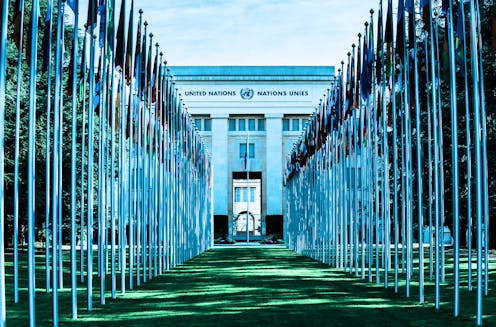Source: The Conversation (Au and NZ) – By Zena Assaad, Senior Lecturer, School of Engineering, Australian National University
The United Nations Secretary-General’s Advisory Board on Artificial Intelligence (AI) has released its final report on governing AI for humanity.
The report presents a blueprint for addressing AI-related risks while still enabling the potential of this technology. It also includes a call to action for all governments and stakeholders to work together in governing AI to foster development and protection of all human rights.
On the surface, this report seems to be a positive step forward for AI, encouraging developments while also mitigating potential harms.
However, the finer details of the report expose a number of concerns.
Reminiscent of the IPCC
The UN advisory board on AI was first convened on October 26, 2023. The purpose of this committee is to advance recommendations for the international governance of AI. It says this approach is needed to ensure the benefits of AI, such as opening new areas of scientific inquiry, are evenly distributed, while the risks of this technology, such as mass surveillance and the spread of misinformation, are mitigated.
The advisory board consists of 39 members from a diversity of regions and professional sectors. Among them are industry representatives from Microsoft, Mozilla, Sony, Collinear AI and OpenAI.
The committee is reminiscent of the UN’s Intergovernmental Panel on Climate Change (IPCC) which aims to provide key input into international climate change negotiations.
The inclusion of prominent industry representatives in the advisory board on AI is a point of difference from the IPCC. This may have advantages, such as a more informed understanding of AI technologies. But it may also have disadvantages, such as biased viewpoints in favour of commercial interests.
The recent release of the final report on governing AI for humanity provides a vital insight into what we can likely expect from this committee.
What’s in the report?
The final report on governing AI for humanity follows an interim report released in December 2023. It proposes seven recommendations for addressing gaps in current AI governance arrangements.
These include the creation of an independent international scientific panel on AI, the creation of an AI standards exchange and the creation of a global AI data framework. The report also ends with a call to action for all governments and relevant stakeholders to collectively govern AI.
What’s disconcerting about the report are the imbalanced and at times contradictory claims made throughout.
For example, the report rightly advocates for governance measures to address the impact of AI on concentrated power and wealth, geopolitical and geoeconomic implications.
However, it also claims that:
no one currently understands all of AI’s inner workings enough to fully control its outputs or predict its evolution.
This claim is not factually correct on many accounts. It is true that there are some “black box” systems – those in which the input is known, but the computational process for generating outputs is not. But AI systems more generally are well understood on a technical level.
AI reflects a spectrum of capabilities. This spectrum ranges from generative AI systems such as ChatGPT, through to deep learning systems such as facial recognition. The assumption that all these systems embody the same level of impenetrable complexity is not accurate.
The inclusion of this claim calls into question the advantages of including industry representatives in the advisory board, as they should be bringing a more informed understanding of AI technologies.
The other issue this claim raises is the notion of AI evolving of its own accord. What has been interesting about the rise of AI over recent years is the accompanying narratives which falsely position AI as a system of agency.
This inaccurate narrative shifts perceived liability and responsibility away from those who design and develop these systems, providing a creative scapegoat for industry.
Despite the subtle undertone of powerlessness in the face of AI technologies and the imbalanced claims made throughout, the report does positively progress the discourse in some ways.
A small step forward
Overall, the report and its call to action are a positive step forward because they emphasise that AI can be governed and regulated, despite contradictory claims throughout the report which imply otherwise.
The inclusion of the term “hallucinations” is a salient example of these contradictions.
The term itself was popularised by OpenAI’s chief executive Sam Altman when he used the term to reframe nonsensical outputs as part of the “magic” of AI. Hallucinations is not a technically accepted term – it’s a creative marketing agenda. Pushing for governance of AI while simultaneously endorsing a term which implies a technology that cannot be governed is not constructive.
What the report lacks is consistency in how AI is perceived and understood.
It also lacks application specificity – a common limitation among many AI initiatives. A global approach to AI governance will only work if it is able to capture the nuances of application and domain specificity.
The report is one step forward in the right direction. However, it will need refinement and amendments to ensure it encourages developments while mitigating the many harms of AI.
![]()
Zena Assaad does not work for, consult, own shares in or receive funding from any company or organisation that would benefit from this article, and has disclosed no relevant affiliations beyond their academic appointment.
– ref. The United Nations has a plan to govern AI – but has it bought the industry’s hype? – https://theconversation.com/the-united-nations-has-a-plan-to-govern-ai-but-has-it-bought-the-industrys-hype-239494





